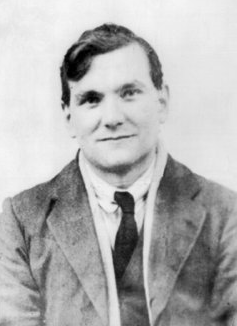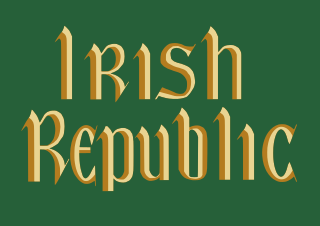Related Research Articles

Irish people in Great Britain or British Irish are immigrants from the island of Ireland living in Great Britain as well as their British-born descendants.

Joe Cahill was a prominent figure in the Irish republican movement in Northern Ireland and former chief of staff of the Provisional Irish Republican Army (IRA). He joined a junior-republican movement, Na Fianna Eireann, in 1937 and the following year, joined the Irish Republican Army. In 1969, Cahill was a key figure in the founding of the Provisional Irish Republican Army. During his time in the Provisional IRA, Cahill helped import weapons and raise financial support. He served as the chief of staff in 1972, but was arrested the following year when a ship importing weapons was intercepted.

Robert Storey was a Provisional Irish Republican Army (IRA) volunteer from Belfast, Northern Ireland. Prior to an 18-year conviction for possessing a rifle, he also spent time on remand for a variety of charges and in total served 20 years in prison. He also played a key role in the Maze Prison escape, the biggest prison break in British penal history.

The M62 coach bombing, sometimes referred to as the M62 Massacre, occurred on 4 February 1974 on the M62 motorway in northern England, when a 25-pound (11 kg) Provisional Irish Republican Army (IRA) bomb hidden inside the luggage locker of a coach carrying off-duty British Armed Forces personnel and their family members exploded, killing twelve people and injuring thirty-eight others aboard the vehicle.
Hugh Aodh Doherty is a Scottish-born Irish republican, who was a former volunteer in the Provisional Irish Republican Army (IRA), known for his role in the Balcombe Street Siege, in London in December 1975.

Maurice Twomey was an Irish republican and the longest serving chief of staff of the Irish Republican Army (IRA).
The S-Plan or Sabotage Campaign or England Campaign was a campaign of bombing and sabotage against the civil, economic and military infrastructure of the United Kingdom from 1939 to 1940, conducted by members of the Irish Republican Army (IRA). It was conceived by Seamus O'Donovan in 1938 at the request of then IRA Chief of Staff Seán Russell. Russell and Joseph McGarrity are thought to have formulated the strategy in 1936. During the campaign there were 300 explosions/acts of sabotage, 10 deaths and 96 injuries.
Jimmy Steele was an Irish republican militant and editor. He was one of the most prominent Irish Republican Army (IRA) men in Belfast after the Irish Civil War. Steele spent most of his life in jail as a result of his actions against British security forces.
Terence Gerard 'Gerry' McGeough is a prominent Irish republican who was a volunteer in the Provisional Irish Republican Army (IRA), a former Sinn Féin activist and editor of the defunct The Hibernian magazine. McGeough broke with Sinn Féin in 2001 and he is now an independent Irish Catholic/nationalist activist. McGeough was set to serve 20 years imprisonment after being found guilty in 2011 for attempted murder, although he was released two years later, on 29 January 2013, under the Good Friday Agreement.

The Troops Out Movement (TOM) was an Irish republican organisation formed in the United Kingdom in 1973, following actions by the British Army in Northern Ireland during the Troubles, including the Bloody Sunday and Ballymurphy massacres by the Parachute Regiment. The organisation's goals were to secure the withdrawal of British troops from Northern Ireland and support self-determination for the Irish people as a whole. These main aims were supplemented by smaller ones such as the demilitarisation of the Northern Irish police and the paramilitary Ulster Special Constabulary (USC) as well as opposition to discriminatory policies against Catholics in Northern Ireland. The TOM sought partnerships and other forms of cooperation with like-minded organisations in Ireland, Great Britain, and internationally.
On 29–30 June 2007, two related terrorist incidents occurred in the United Kingdom. In the second incident, one of the two perpetrators was killed, while five civilians were injured, none of them seriously.
Donna Maguire is a former volunteer in the Provisional Irish Republican Army (IRA) once described as Europe's most dangerous woman.

Martin Meehan was a Sinn Féin politician and former volunteer in the Provisional Irish Republican Army (IRA). Meehan was the first person to be convicted of membership of the Provisional IRA, and he spent eighteen years in prison during the Troubles.

Prior to the deportation of individuals of Jewish background to the concentration camps there were at least 2,173 Jews in Norway. During the Nazi occupation of Norway 772 of these were arrested, detained, and/or deported, most of them sent to Auschwitz. 742 were murdered in the camps, 23 died as a result of extrajudicial execution, murder, and suicide during the war. Between 28 and 34 of those deported survived their continued imprisonment. The Norwegian police and German authorities kept records of these victims, and so, researchers were able to compile information about the deportees.
John Nutt was an English pirate. He was one of the more notorious brigands of his time, raiding the coast of southern Canada and western England for over three years before his capture by Sir John Eliot in 1623. His arrest and conviction caused a scandal in the English court, after Nutt paid Eliot £500 in exchange for a pardon, and was eventually released by Secretary of State George Calvert.
R v Secretary of State for Home Affairs ex parte O'Brien [1923] 2 KB 361 was a 1923 test case in English law that sought to have the internment and deportation of Irish nationalist sympathisers earlier that year declared legally invalid. In March 1923 between 80 and 100 suspected Irish nationalists in Britain were arrested by the police and sent to the Irish Free State under the Restoration of Order in Ireland Act 1920 (ROIA). One of the detainees, Art O'Brien, challenged his detention in a test case at the Divisional Court. The case eventually went to both the Court of Appeal and House of Lords, who decided that the internments were illegal because the Irish Free State was an independent nation and so British Acts of Parliament no longer applied to it.
Events from 1991 in England
Soviet deportations from Lithuania were a series of 35 mass deportations carried out in Lithuania, a country that was occupied as a constituent socialist republic of the Soviet Union, in 1941 and 1945–1952. At least 130,000 people, 70% of them women and children, were forcibly transported to labor camps and other forced settlements in remote parts of the Soviet Union, particularly in the Irkutsk Oblast and Krasnoyarsk Krai. Among the deportees were about 4,500 Poles. Deportations included Lithuanian partisans and their sympathizers or political prisoners deported to Gulag labor camps. Deportations of the civilians served a double purpose: repressing resistance to Sovietization policies in Lithuania and providing free labor in sparsely inhabited areas of the Soviet Union. Approximately 28,000 of Lithuanian deportees died in exile due to poor living conditions. After Stalin's death in 1953, the deportees were slowly and gradually released. The last deportees were released only in 1963. Some 60,000 managed to return to Lithuania, while 30,000 were prohibited from settling back in their homeland. Similar deportations took place in Latvia, Estonia, and other parts of the Soviet Union. Lithuania observes the annual Mourning and Hope Day on June 14 in memory of those deported.

Clann na hÉireann was a support organisation among Irish emigrants in Great Britain for Sinn Féin during the 1960s and its successor organisation the Workers' Party in the 1970s and the 1980s.
References
- 1 2 3 4 "Aidan Lawes; Politics and Trade Unions; Moving Here". Archived from the original on 30 May 2008. Retrieved 25 May 2008.
- ↑ Mannion, Patrick. "The Self-Determination for Ireland League of Canada and Newfoundland". Century Ireland. RTE. Archived from the original on 18 December 2020. Retrieved 16 December 2020.
- ↑ "Patrick Brennan; The IRA in Jarrow - ". Archived from the original on 26 April 2008. Retrieved 25 May 2008.